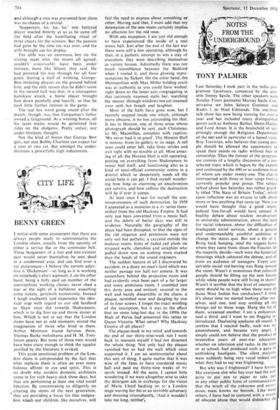BENNY GREEN
I notice with some amusement that there are always people ready to sentimentalise the London slums, usually from the sanctity of either a service flat or the commuter belt. These berapaners of a lost and non-existent past would never themselves be seen dead in a condemned area, and can find even a rat picturesque—I believe the current adjec- tive is 'Dickensian'—so long as it is working on somebody's else's wainscot. I, on the other hand, being a fully paid up member of the metropolitan working classes, never shed a tear at the sight of a bulldozer assaulting some rickety, jerrybuilt monstrosity. Instead I laugh exultantly and experience the iden- tical urge with regard to our old landlord as Shaw once did towards Shakespeare, which is to dig him up and throw stones at him. Which is not to say that the London slums have not at odd moments stirred the imagination of those who lived in them. Arthur Morrison found heroism there, Thomas Burke melodrama and H. M. Tom- linson poetry. But none of those men would have been crazy enough to think the squalor justified by the literature it evoked.
This acute emotional problem of the Lon- don slums is compounded by the fact that what replaces them is often an even more hideous affront to eye and spirit. This is no doubt why modem domestic architects come in for such heavy stick these days. but they are performing at least one vital social function. By concentrating so diligently on creating the slums of the next generation, they are providing a focus for that indigna- tion which our children, like ourselves, will
feel the need to express about something or other. Having said that, I must add that my detestation of the new slums certainly implies no affection for the old ones.
With one exception. 1 am just old enough to have experienced the inside of a real music hall. Just after the end of the last war there were still a few operating, although by then, in a pathetic attempt to win a stay of execution, they were describing themselves as variety houses. Admittedly there was not much resemblance between the Bedford when I visited it, and those glowing repre- sentations by Sickert. On the other hand, the Metropolitan with Max Miller holding court was as authentic as you could have wished, right down to the lesser acts congregating in , that curiously exposed stalls bar, watching the master through windows not-yet steamed over with hot breath and laughter.
Most of the halls have gone now, but I recently stepped inside one which, although more obscure, is no less astounding for that. It lies in Hoxton, one of those areas whose photograph should be sent, each Christmas, to Mr Macmillan, complete with caption, 'We never had it so good'. The Hoxton Hall is minute, from its gallery to its stage. A tall man could enter left, take three strides and exit right with no trouble at all. Most amaz- ing of all, the Hoxton Hall is still operating, putting on everything from Shakespeare to music hall itself, and functioning also as a kind of semi-official community centre in a district which so desperately needs all the social help it can get. I find myself wonder- ing how long so charming an anachronism can survive, and how callous the destruction will bp if ever it comes.
At least once I saw for myself the con- temptuousness of such destruction. In 1958 I appeared as a musician in a ry series trans- mitted from the old Hackney Empire. It had only just been converted from a music hall, and the debris of better days was still in evidence. Naturally the geography of the place had been disrupted, so that the signs of the old elegance and pretension were not only sad but pathetic; a caryatid outside the makeup room; hints of faded Jed plush on stripped walls; cherubim and seraphim who puffed down now on nothing more exalted than the heads of the sound engineers.
The saddest feature of all I discovered by accident, in a dusty no-man's-land which was neither passage nor hall nor annexe. It was somewhere behind the projection room and had evidently once been part of a far larger and more ambitious room. I stumbled into this dusty area and noticed, secured to the wall and barely discernible in the chaos, a plaque, tarnished now and dangling by one of its four screws. I forget the exact wording of the inscription, but it was to the effect that on some long-lost day in the 1890s the Shah of Persia had presented this settee to Queen Victoria. What settee? Why Hackney Empire of all places? _ The plaque stuck in my mind, and towards the end of our thirty-nine-week run I went back to reassure myself I had not dreamed the whole thing. Not only had the plaque vanished but so had the wall which once supported it. I am no sentimentalist about this sort of thing. I quite realise that it was wise of the fates to have murdered music hall and paid me thirty-nine weeks of TV spoils instead. All the same, I cannot help wondering if we were altogether wise to take the detergent ads in exchange for the vision of Marie Lloyd backing on to a London stage waving her fist at an invisible adversary and shouting triumphantly, 'And it wouldn't take me long, neither',










































 Previous page
Previous page